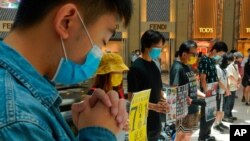Several civic groups in Hong Kong announced that they would disband on Tuesday, hours after China’s legal body passed the new national security law for Hong Kong.
The law carries severe penalties for vaguely defined crimes against the state, effectively ending many of the special freedoms that citizens of the territory long enjoyed.
VOA Cantonese Service reporter Iris Tong talked with three pro-democracy activists about their reaction to the law and the future of Hong Kong.
Tony Chung, 19, Student localism
Chung is the organizer of Student localism, a political organization of mostly middle school students that advocated Hong Kong’s independence. He said the organization would no longer be effective if members risked breaking the law by handing out leaflets and shouting slogans.
“We want to hand over our operations to those members who are abroad," he said. “They can keep promoting our ideas through online articles and pages.”
Chung thinks the law will foster more political polarization in Hong Kong.
“One group of people will just be more obedient. They understand you can’t speak your mind or have to be extremely careful when expressing your opinions. The other group will resort to extreme force. They will say, ‘Talking is useless,’ and might resort to force. So, I think some armed attack and small conflict can’t be ruled out,” he said.
Ventus Lau, 26, Hong Kong Civil Assembly Team
Lau is the spokesman for the Hong Kong Civil Assembly Team, which supported other civil rights groups in last year’s anti-extradition protests. He said the fact that no one knows the details of the new law is absurd.
“The ridiculous thing is we don’t even know if we have violated the law. For example, if you steal something, you know you have committed a crime and might face arrest. But with the national security law, we don’t know if we have committed a crime, or if any past actions would be subject to this law. We are all guessing here. This is not a law — this is an excuse for the CCP to suppress dissidents,” he said.
Albert Ho, 68, HK Alliance
Ho is vice chairman of HK Alliance, a democratic organization formed in 1989 to support the Tiananmen Square demonstrations in Beijing.
“I don’t need to go into exile, nor do I need to dissolve my organization,” he said. “We have never advocated for Hong Kong independence, and we have always advocated the use of peaceful methods to promote reform. We have never been in favor of using violence to change the status quo.”
He said people must be more flexible to continue their fight. He pointed to the annual vigil in Victoria Park commemorating the 1989 Tiananmen Square massacre as an example.
“There’s a curfew on June 4th. Can I come out on June 5th with a candle? If we are not allowed to use candles, can we use mobile phones? The vast majority of people will find a space to resist. If you want to suffocate Hong Kong, then eventually, both sides will get hurt,” he said.




